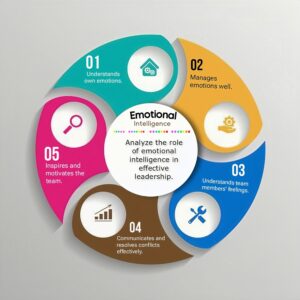Give examples of how leaders can leverage EI to improve team performance and boost morale.
Emotional intelligence (EI) is crucial for effective leadership because it helps leaders understand and manage their own emotions and connect with others on a deeper level. Here’s how EI enhances leadership: How Emotional Intelligence Enhances Leadership Self-Awareness: Leaders who understand theirRead more
Emotional intelligence (EI) is crucial for effective leadership because it helps leaders understand and manage their own emotions and connect with others on a deeper level. Here’s how EI enhances leadership:
How Emotional Intelligence Enhances Leadership
- Self-Awareness: Leaders who understand their own emotions are better at managing them, which helps them stay calm and make thoughtful decisions, even under pressure.
- Empathy: Leaders with high EI can genuinely understand and share the feelings of others. This helps them build strong, supportive relationships and respond to their team’s needs with compassion.
- Communication: Emotional intelligence improves how leaders communicate. They can express themselves clearly and listen actively, fostering an environment where team members feel heard and valued.
- Conflict Resolution: EI helps leaders handle conflicts with sensitivity. They can navigate disagreements with an understanding of different viewpoints and find solutions that work for everyone involved.
- Motivation and Inspiration: Leaders with high EI inspire and motivate their teams by recognizing their efforts and encouraging their growth. They create a positive atmosphere that boosts morale and productivity.
- Adaptability: Emotionally intelligent leaders are flexible and resilient. They manage stress well and guide their teams through change with understanding and support.
Leaders with High Emotional Intelligence
- Narendra Modi (Prime Minister of India)
- Empathy and Communication: Modi connects with people through his speeches and social media, showing an understanding of their concerns and aspirations. His approach reflects a deep awareness of public sentiment and needs.
- Motivation: Modi’s speeches and initiatives often aim to inspire and unite people, creating a sense of collective purpose and motivation.
- Ratan Tata (Former Chairman of Tata Group)
- Self-Awareness and Empathy: Ratan Tata is known for his genuine concern for his employees and his humble approach to leadership. He listens to his team and values their input, fostering a supportive work environment.
- Conflict Resolution: Tata handles business challenges with patience and a focus on finding constructive solutions, demonstrating his ability to manage conflicts effectively.
- Indra Nooyi (Former CEO of PepsiCo)
- Communication and Motivation: Indra Nooyi’s ability to communicate clearly and inspire her team was key to her success. She valued inclusivity and made sure her employees felt appreciated and motivated.
- Adaptability: During her leadership, Nooyi navigated PepsiCo through various changes with grace, showing resilience and flexibility.
- Dr. APJ Abdul Kalam (Former President of India)
- Empathy and Inspiration: Dr. Kalam had a unique ability to connect with people from all walks of life. His inspiring speeches and personal interactions motivated many, especially the youth.
- Conflict Resolution: In his various roles, Dr. Kalam approached challenges with a focus on constructive solutions and a deep respect for different perspectives.
Leaders with high emotional intelligence excel because they manage their own emotions well, understand and empathize with others, and communicate effectively. Indian leaders like Narendra Modi, Ratan Tata, Indra Nooyi, and Dr. APJ Abdul Kalam show how EI can lead to compassionate, effective leadership that inspires and supports others while navigating challenges with empathy and insight.
See less

See less